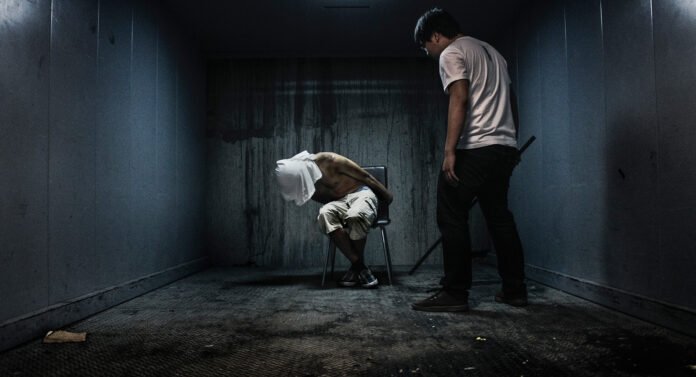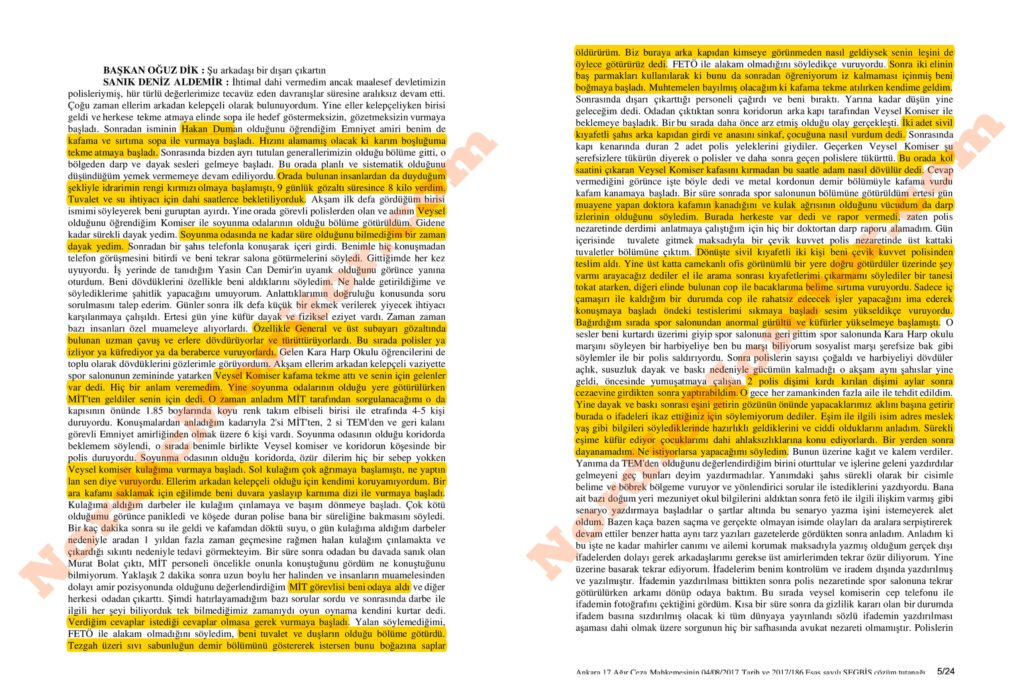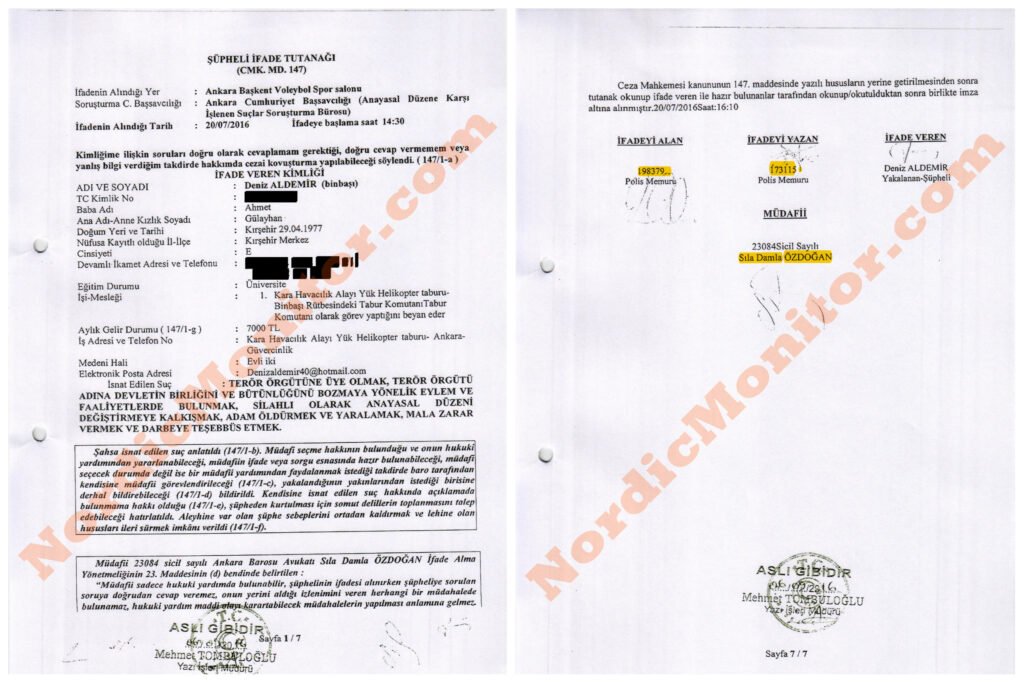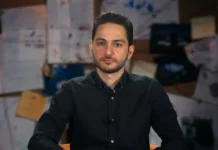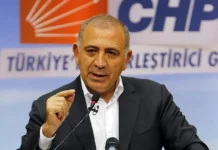Agents of Turkey’s National Intelligence Organization (MIT), were involved in select torture sessions at an unofficial site run by the police in order to help support the government’s false narrative concerning a coup attempt in 2016, Nordic Monitor reported.
According to court documents obtained by Nordic Monitor, Staff Maj. Deniz Aldemir, a 44-year-old veteran pilot and commander of the helicopter transport battalion in the Turkish Land Forces, revealed how MIT agents tortured him and several others to force them to sign false confessions. Aldemir said he witnessed how police discreetly allowed MIT agents to enter the site wearing police vests and helped the agents torture suspects who had nothing to do with the coup attempt.
Aldemir also identified a key police chief by name who ran the sports hall that was turned into a torture site for hundreds of military officers, privates and cadets at the hands of regime thugs. In his testimony to the Ankara 17th High Criminal Court on August 4, 2017, the major said the police dictated s statement to him that was prepared in advance and that he had to give up his resistance after days of brutal torture that, at times, amounted to sexual harassment and threats of rape of his wife and children.
On July 15, 2016 Aldemir flew transport helicopters twice to carry cadets and ammunition after an alarm was sounded over the threat of a terrorist attack by the Islamic State in Iraq and Syria (ISIS) on his base in Ankara’s Güvercinlik neighborhood. As he had done so many times in his military career, he followed the orders of his commending officers. The events turned out to a be a false flag coup bid orchestrated by President Recep Tayyip Erdoğan and his intelligence and military chiefs to create a pretext to launch a mass purge of NATO officers from the alliance’s second largest army.
The next day, he voluntarily gave a statement to the military prosecutor and told him what he had experienced and what he had done. The police later took him into custody, and he was moved to a sports hall operated by Turkey’s Voleyball Federation in Ankara. The abuse started during the trip in the car, with police beating him, spitting in his face and using foul language. He was effectively tried and found convicted right there in the police car.
When the car pulled up in front of the sports hall, he was told to walk along a corridor formed by the police lined up on the left and right to give a terrible welcoming reception to the military officers. Detainees, handcuffed and unprotected, were kicked and punched as they were forced to go through this human corridor until they arrived at the hall. “A man in front of me started to bleed when he received a blow that caused his eyeglasses fall to the ground and break. We finally reached the building after suffering punches, kicks, spits and profanities on the nearly 50-meter-long corridor,” he recalled.
The detainees’ personal belongings, cash and other valuables were plundered by the police who considered them jihadist spoils. “A 1,000 Turkish lira note and $1,200 that I couldn’t exchange because I’d just arrived from abroad went missing from my wallet. I’ve heard that many lost their wedding rings and valuable possessions during their detention,” Aldemir told the court.
The torture continued in the hall where he and others were forced to kneel in a stress position for hours. Those who couldn’t bear it were punished with kicks and punches. The police used stacked plastic handcuffs as whips to beat the detainees all over. They were told their wives are considered spoils of war, just like ISIS treated its prisoners in Syria and Iraq and that they were going to have sex with them as well as their children.
At one point, a man came into the hall and started kicking and beating detainees with a wooden baton. “The police chief, whose name I later learned was Hakan Duman, started hitting me in the head and back with this. Later he kicked me in my stomach as his rage was apparently not over yet,” Aldemir said. The police chief then moved to the section where generals were held, unleashing his fury on them, with Aldemir remembering hearing cries and the sounds of beating coming from there.

The detainees were denied food for several days and forced to stand in line for hours in order to be taken to a toilet, another form of torture of detainees who were not even charged and not officially in police custody. No lawyer or family members were allowed to visit them.
One night, a man Aldemir said he saw for the first time separated him from others, and he was taken to a locker room by a policeman who was called Veysel by his colleagues. The beatings started in the locker room, although Aldemir said didn’t remember how long they lasted. He was taken back to the main hall again.
Part of the transcript from Maj. Deniz Aldemir’s court testimony that reveals MIT agents were involved in torture:
The police forced privates to beat generals and senior military officers, at times joining them with their own punches and kicks, he recalled.
On another night he suddenly woke up with a hard kick to his head by Veysel, who told him some people had come for him. While he was being taken to the locker room, Veysel said MIT agents wanted to question him. “As far as I could tell from their conversation among themselves, two of the men were from MIT, two from the police counterterrorism department and the rest were regular police officers,” he told the panel of judges.
For a brief time, he was kept in the corridor leading to the locker room while MIT agents and police were questioning another detainee named Murat Bolat, whom he saw as he was being taken out of the room. While waiting in the corridor, Veysel suddenly decided to hit him on the ear very hard, causing him to lose his balance and become disoriented. Then he put him against the wall and started hitting Aldemir’s stomach with his knee. “More than a year later, my left ear is still ringing [from the blows], and I am being treated for the problems it caused,” Aldemir said.
Several minutes later, a MIT agent took him to the locker room, asked all the others to leave and started asking questions. “He started beating me when the answers I gave weren’t the answers he wanted to hear,” Aldemir said. “He then took me to the section of the hall where the bathroom and the showers were located and pointed at the metal part of the liquid soap dispenser on the counter and said he could stick that in my throat and kill me right there if he wanted to. ‘Just like we came here through the back door without being seen by anyone, we could also take your lifeless body away without anybody noticing,’ the MIT agent said,” Aldemir related.
“Then he started choking me with his thumbs, which I later learned was to leave no trace. I’d probably fainted at that point because I woke up with kicks to the head,” he recalled. The agent threatened to come back the next day and gave him 24 hours to reconsider his statement. The two MIT agents left the hall from the back door, wearing police vests.
Veysel took him out of the room and started hitting him in the head, this time with the metal wristband on his watch, causing his head to bleed while they were in the corridor. He was brought back to main hall again. The next day, when he saw the doctor, Aldemir tried to explain about his injuries and torture, but the doctor refused to put the torture in his report, saying that all detainees had gone through similar ordeals.
Although doctors refused to document the marks of torture on his body due to police intimidation, multiple witnesses came forward during the trial to testify that they saw Aldemir in terrible shape after torture sessions. Lt. Col. Yasin Candemir, also a pilot, told the court on August 3, 2017 he personally witnessed the tortured Aldemir in the sports hall. “It’s not just me, everybody there saw him [after Aldemir was subjected to torture],” he testified under oath during cross examination.
Lt. Col. Yasin Candemir verified torture allegations as a witness when he took the stand:
The day after the encounter with the MIT agents, Aldemir was picked up again and taken to an office on the upper floor of the sports hall by two men in civilian clothes. This time he was ordered to take off his clothes and forced to reman naked. One was slapping his face while other hit him on the legs and back with a baton. They started talking about using the baton for sexual torture, Aldemir said. The one standing in front of him squeezed his testicles so hard that Aldemir screamed from the excruciating pain. The men stopped the torture when they heard a loud noise coming from the main sports hall where the other detainees were kept. Apparently a beating was taking place in the hall, and that disruption saved him from further abuse and torture in the room. He was taken back to the hall.
The torture resumed during the night, again with the same men. He was threatened with harm to his family and sustained a broken tooth from multiple punches. It took months before he managed to have the tooth fixed when he was in prison. The men told him his wife would be brought to the hall and raped in front of him and that the same would be done to his children. “When they gave detailed information about my wife, such as her name, address and profession, I knew they were prepared to do what they said and that they were serious,” Aldemir explained.
“At some point, I gave up. I said I’d do whatever they wanted. They gave me paper and pen and dictated what I would write,” he recalled. He said had to sign a statement that falsely accused others and named people he had never met. Appearing for the first time in court after a year in pre-trial detention, he offered his apology to the people who suffered because of this false statement but said he had to do it to protect his family. He said on the record that he totally disavowed the false statement and that it did not reflect the true account of the July 15 events.
False statement that was forced on Maj. Deniz Aldemir under torture identified two police officers with their badge numbers and a bar-appointed lawyer with her name as accomplices in the abuse:
But the damage was already done. The police leaked the false statement to the press right after he signed it under duress in order to support the government storyline on the false flag coup bid. He had already been convicted in the public eye with the falsified statement, and the government made the best out of this statement. His filings from prison that said how this statement was based on lies did not get reported in the Turkish media, which came under government control after it shuttered nearly 200 media outlets and imprisoned more than 150 journalists in the aftermath of the July 15 events. Journalists Sedat Ergin and Toygun Atilla were named by Aldemir in court as the people who received the leak and used the false statement to smear him.
Interestingly enough, Aldemir’s initial statement that was taken under torture was key evidence submitted by Turkey to the US Department of Justice to justify its request for the extradition of Fethullah Gülen, an outspoken critic of President Erdoğan who was accused of masterminding the coup bid. Gülen repeatedly denied having any role in the putschist attempt, and the Erdoğan government has failed to present any evidence to support allegations against the 79-year-old Turkish Muslim scholar, who has been living in self-exile in the US since 1999.
The Justice Department also concluded that the Turkish government’s case against Gülen lacked solid evidence.
A bar-appointed lawyer named Sıla Damla Özdoğan, brought by the police to create the pretense of due process, did not even bother showing up during the interrogation, and she signed the statement afterwards although the prosecutor claimed in the indictment that Aldemir’s lawyer was present and that he voluntarily and of his own free will signed the statement. Months later when Aldemir’s wife, Deniz Aldemir, confronted the lawyer and asked her why she hadn’t filed a criminal complaint for the torture of her husband, the lawyer threatened Aldemir’s wife. In fact, after the lawyer’s complaint and a personal call to the prosecutor, Deniz Aldemir was detained in November 2016 and dismissed from her job.
Bar-appointed lawyer Sıla Damla Özdoğan did not show up during the interrogation of Aldemir but signed documents as if she were there and helped prosecute Aldemir’s wife:
Aldemir’s indictment is full of contradictions. The prosecutor claimed that Aldemir confessed to having heard a conversation about a coup plot in May 2016 while he was at the Güvercinlik base in Ankara. However, at the time he was serving in the southeastern province of Şırnak, followed by a training course in the United States.
He and his co-pilot flew a Cougar helicopter with tail number 10503 to transport unarmed cadets to General Staff headquarters. The chopper’s blade was damaged from ground fire, and they had to take the helicopter to Güvercinlik. Aldemir said this was confirmed by CCTV footage at the base. Although the Cougar could not fly after sustaining the damage, the prosecutor claimed the same chopper transported troops all night long among various drop points.
What is more, the cell phone signals of Aldemir and his co-pilot, listed in the indictment, did not match the CCTV recording at the base. At the time both men were seen at the base according to CCTV footage, but the prosecutor claimed they flew the helicopter to various parts of the city because cell phone signals were received from those locations. Being in two places at the same time is physically impossible, but the prosecutor claimed otherwise, Aldemir said in his defense.

The revelations in court panicked the prosecutor, who summoned Aldemir from his prison cell to talk to him in private without his lawyer present. In his second testimony, on August 1, 2018, Aldemir revealed what the prosecutor offered him. “The prosecutor who filed the indictment [Alpaslan Karabay] started the conversation by threatening my wife and children. He wanted me to lie, and he didn’t want my lawyer to be there. First, he sent me a message saying ‘I’ll get you out in four years.’ Then it escalated to a threat,” Aldemir revealed.
Despite a lack of evidence and the apparent torture and abuse, Aldemir was convicted in May 2019 and sentenced to aggravated life. In the meantime, his torturer, police chief Duman, was promoted to deputy chief of the Ankara police department.

